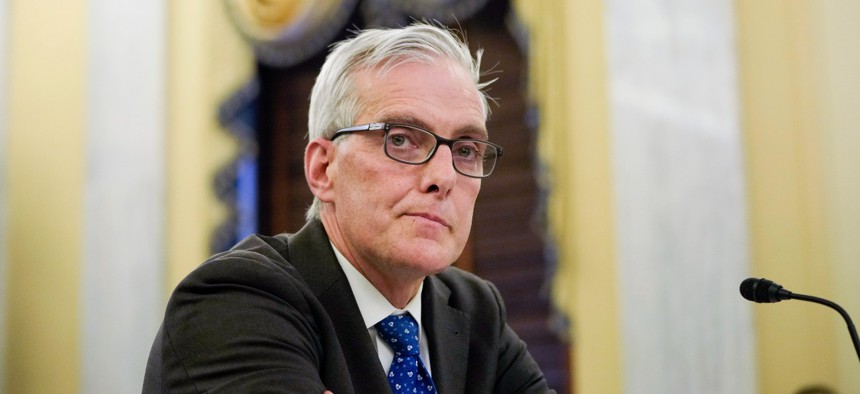
VA Secretary Denis McDonough testifies during a Senate Veterans' Affairs Committee hearing on Capitol Hill on Dec. 1, 2021. McDonough has maintained that current statute does not prohibit VA from providing abortions, despite his acknowledgment that it has not done so since at least 1989 and lawmakers disputing the claim. Drew Angerer/Getty Images
VA Is 'Closely Watching' the Fate of Abortion Access as It Weighs Offering the Service
The leader of the largest hospital network in the country says he has the authority to change the department's policy.
The Veterans Affairs Department is “closely watching” how access to abortions shakes out after the fall of Roe v. Wade, suggesting on Wednesday it could unilaterally decide to offer the service if its availability drops precipitously for veterans across the country.
The department has the legal authority to offer abortions, VA Secretary Denis McDonough said, and would have to simply engage in a rulemaking process to change its policy. McDonough has maintained that current statute does not prohibit VA from providing abortions, despite his acknowledgment that it has not done so since at least 1989 and lawmakers disputing the claim. The secretary noted VA provides care to 300,000 child-bearing age female veterans and he takes the department’s responsibility to them seriously.
“We are closely watching what happens for our vets and if we see there is a diminution in access to services, or if we see that because of threatened legal jeopardy to our providers or confusion from our providers about what is allowable, if we see that and think, therefore, that we need to change policy and make those rules, we will,” McDonough told reporters. “We have not yet decided to do so but we’re obviously watching that very, very closely.”
The secretary did not spell out the legal thinking behind his claim but said it is a “long-held view” of VA’s Office of General Counsel that the department is not statutorily prohibited from providing abortion counseling or services. McDonough has reiterated that stance in congressional testimony and correspondence with lawmakers, some of whom have noted the 1992 Veterans Health Care Act appears to ban abortions at VA. The law says VA may provide to women "general reproductive health care, including the management of menopause, but not including under this section infertility services, abortions, or pregnancy care" except in cases relating to pregnancy complications. Another statutory provision known as the Hyde Amendment has for decades prevented any federal funds from going toward abortions.
McDonough stressed that VA will provide appropriate care in any situation in which the life or health of a mother is threatened. He noted VA will provide services to those experiencing miscarriages or ectopic pregnancies, but they do not constitute abortion services. That care has continued at VA despite the recent decision from the Supreme Court.
“If there is a state law, for example, that inhibits the provision of that care, we will make sure that our providers have the support to continue that access to care,” McDonough said. “We’ve coordinated closely with the Department of Justice and we will continue to do so.”
Eight states have banned abortion since the Supreme Court's decision in Dobbs v. Jackson Women's Health Organization last month, while many others appear on the precipice of doing so soon or have already passed significant restrictions. McDonough said if VA changes its policy, it will give a heads up to Congress and subsequently begin the rulemaking process. Such an approach would likely face significant resistance from Republicans in Congress.
After McDonough detailed his interpretation of VA’s legal authority last year, Sen. Jerry Moran, R-Kan., the top Republican on the Senate Veterans Affairs Committee, said, “What is troubling about these statements is that VA’s prohibition on abortion services is more than a policy decision or regulatory matter, it’s the law.”
McDonough said on Wednesday he has not yet made any decision and it “will be a fact-based determination for me.”







